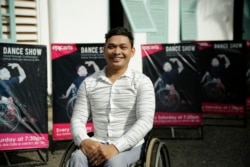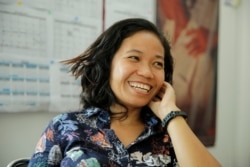Kim Socheat moved from Phnom Penh when he was 11, living and studying at two different non-government organizations in Kandal province’s Takhmao town. The performance artist, who works with Epic Arts Cambodia, has polio in his lower extremities.
After getting his high school diploma, Kim Socheat faced financial constraints. His mother’s earnings, from selling desserts in Sihanoukville, could not cover what he needed to enroll in a Phnom Penh university.
However, he learned of Epic Arts’ work in Kampot province and, despite initial apprehension, Kim Socheat enrolled. Two years later, he was a trained contemporary arts performer.
“I didn’t want to come [to Kampot]; I thought that it was crazy to come to Epic Arts because back then I wanted to go to university. But, I didn’t have the $300 a year to pay half of the tuition,” Kim Socheat said.
Epic Arts Cambodia is an arts organization that promotes the inclusion of people with disabilities through the arts. It runs multiple programs, including social enterprise projects like a café in Kampot province that also helps fund the organization.
Performances by artists trained at Epic Arts frequently involve both people with and without disabilities, often challenging stereotypes and combating negative attitudes towards the disabled community.
Kim Socheat said despite increased awareness of Epic Arts and performers with disabilities, it was difficult to find venues accessible to people with disabilities.
“When I visit Phnom Penh, the majority of places I go to do not have ramps for wheelchair users, so many times I decide to get off and physically move my wheelchair up the stairs,” he said.
His colleague, Reul Teuly, also uses a wheelchair. He said older, and often prestigious, performance venues had not upgraded their facilities to make them easily accessible to people with disabilities.
After an electric shock incident in 2012 that resulted in the amputation of his legs, the 27-year-old performer joined Epic Arts in 2015 on a relative’s suggestion.
“Getting to venues in Phnom Penh, Chenla Theater, and Chaktomuk Theater, is really rough for me because I have to use a wheelchair,” he said.
Reul Teuly said he often needed help to access stages that were on the second floor of buildings without elevators. These experiences were a stark reminder for him of people’s attitudes, including his own, towards people with disabilities.
“Ten years ago, I used to imitate people with disabilities; and now that I have become disabled,” he said. “I can feel how much pressure [people with disabilities] have to go through for not being included and valued by their communities.”
Onn Sokny, country director of Epic Arts Cambodia, said the organization works to change attitudes towards people with disabilities, while at the same time ensuring that they were able to access education and personal development opportunities.
Onn Sokny, who has polio in her right leg, said she was acutely aware of the negative stereotypes facing students at Epic Arts. These attitudes are difficult to change, she said, even though there have been some policy initiatives to address the issue.
“I want to connect the dots between what people with disabilities faced in real life with how they have fought to become successful,” she said.
“I also want to shape policies that affect disabled people’s rights in order to make it more reflexive of their needs.”
One of the common stereotypes that performers with disabilities faced, she said, was that they performed only to earn money. This, Onn Sokny said, minimized a performer’s ambitions and talent.
She wants Epic Arts to flip this to focus on the performer’s skills and their passion for the arts.
“When we accept art in all its forms, we focus on the quality of the arts rather than whether it is being performed by disabled or non-disabled performers,” she said.
The conducive environment at Epic Arts was what Morn Chea needed after facing toxic stereotypes around him.
Morn Chea was 20 years old when he had his arms amputated after an electrical injury. The singer, dancer and visual artist said people he knew mocked him for being “useless”.
Comments like that hit him hard, and he stayed home for nearly two years to avoid similar remarks.
“When I didn’t have a job and only stayed at home, some people said to me ‘if I were disabled like you, I would just commit suicide’,” Morn Chea said.
After joining the performance group in 2015, Morn Chea said he realized that the change had to come from people without disabilities and their attitudes towards the disabled community.
“My observation is that our society [thinks of] people with disabilities as not being able to perform as well as non-disabled people,” he said.
“But I implore them to see our ability… we can perform tasks just like any ordinary people can,” Morn Chea added.
For Onn Sokny, the organization’s director, there have been many challenges in her decade-long experience working with disabled performers offset by an “easy, fun and engaging” process.
Epic Arts performers are skilled professionals, she said. “They are performers at Epic Arts not because they are disabled."






